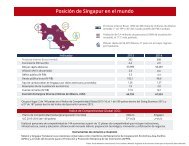basic-guide-to-exporting_Latest_eg_main_086196
basic-guide-to-exporting_Latest_eg_main_086196
basic-guide-to-exporting_Latest_eg_main_086196
You also want an ePaper? Increase the reach of your titles
YUMPU automatically turns print PDFs into web optimized ePapers that Google loves.
Commonly Used TermsIt is important <strong>to</strong> understand and use sales terms correctly. A simplemisunderstanding may prevent you from meeting contractual obligations or makeyou responsible for shipping costs you had sought <strong>to</strong> avoid.When quoting a price, make it meaningful <strong>to</strong> the prospective buyer. For example, aprice for industrial machinery quoted “EXW Saginaw, Michigan, not export packed”would be meaningless <strong>to</strong> most prospective foreign buyers. These potential cus<strong>to</strong>mersmight find it difficult <strong>to</strong> determine the <strong>to</strong>tal cost and, therefore, might hesitate <strong>to</strong>place an order. You should quote CIF or CIP prices whenever possible, <strong>to</strong> show theforeign buyer the cost of getting the product <strong>to</strong> or near the desired destination.If possible, quote the price in U.S.dollars. This will eliminate the riskof exchange rate fluctuations andproblems with currency conversion.U.S. Commercial Service internationaltrade specialists can provide additionalhelp with understanding the definitionsand uses of export shipping terms.If you need assistance in figuring CIFor CIP prices, an international freightforwarder can help. You shouldfurnish the freight forwarder witha description of the product <strong>to</strong> be exported and its weight and cubic measurementwhen packed. The freight forwarder can compute the CIF price, usually at no charge.Cost, Insurance, and Freight (CIF)Cost, insurance, and freight <strong>to</strong> a named overseas port. The seller quotes a price forthe goods (including insurance), all transportation, and miscellaneous charges <strong>to</strong> thepoint of debarkation from the vessel. (The term is used only for ocean shipments.)Cost and Freight (CFR)Cost and freight <strong>to</strong> a named overseas port. The seller quotes a price for the goodsthat includes the cost of transportation <strong>to</strong> the named point of debarkation fromthe vessel. The buyer covers the cost of insurance. (The term applies only forocean shipments.)Carriage Paid To (CPT)/Carriage and Insurance Paid To (CIP)CPT and CIP apply <strong>to</strong> a named destination. These terms are used in place of CFR andCIF, respectively, for all modes of transportation, including intermodal.Ex Works (EXW)Meaning “from a named point of origin”; common variations include ex fac<strong>to</strong>ry, exmill, or ex warehouse. States that the price quoted applies only at the point of origin(i.e., the seller’s premises). The seller agrees <strong>to</strong> place the goods at the buyer’s disposalat the specified place within a fixed time period. All other obligations, risks, and costsbeyond the named point of origin are the buyer’s.152U.S. Commercial Service • A Basic Guide <strong>to</strong> Exporting





